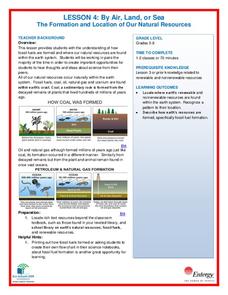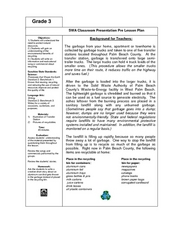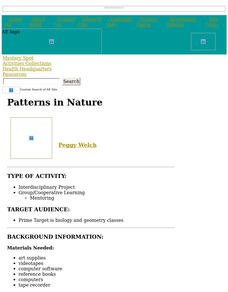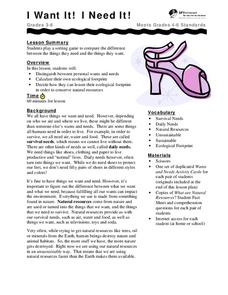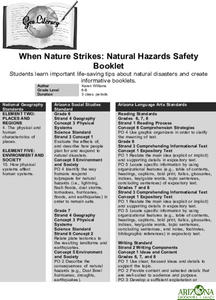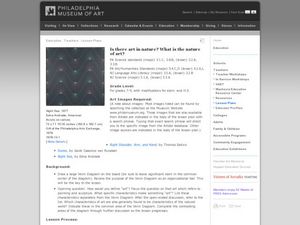American Chemical Society
Natural Resources and Synthetic Materials
All synthetic materials began as natural materials. An engaging lesson plan begins with a hands-on activity and an example of the type of research that scholars perform independently. Then pupils receive a topic and begin researching the...
National Science Teacher Association
Middle School Sampler: Science
Focus on inquiry-based learning in your science class with a series of activities designed for middle schoolers. A helpful packet samples four different texts, which include activities about predator-prey relationships, Earth's axis and...
National Wildlife Federation
By Air, Land, or Sea: The Formation and Location of Our Natural Resources
Coal forms from the ancient remains of plants that were alive on Earth before the dinosaurs! Scholars use their t-charts from the previous lesson over resources and research to determine if their information is correct. Through analysis...
Curated OER
The Natural State
Following an examination of the Arkansas state quarter, your class will discuss the state's nickname: "The Natural State." They will focus on its abundance of natural resources. Printables for the activities are included.
Saint Louis Zoo
Introduction to Natural Selection: Darwin & Lamarck
Charles Darwin and Jean Baptiste Lamarck are credited for developing the theory of natural selection. After teaching your beginning biologists about acquired characteristics, they read the included selection and answer questions that...
Chicago Botanic Garden
Nature Walk and Ecosystem Introduction
A food web has no organism higher than a tertiary consumer because there wouldn't be enough energy left to sustain them. The fourth installment in a seven-part series begins with a nature walk to get pupils thinking about their...
EngageNY
End of Unit Assessment Part II: Science Talk
Scholars complete Part 2 of their end of unit assessment by having a science talk. Pupils pair up to answer questions about what makes a natural disaster. As one learner talks, the other records what is said. They then trade places.
Curated OER
Protecting Natural Resources
Third graders recognize what our natural resources are and their importance. In this natural resource recycling lesson, 3rd graders understand why it is important to recycle and conserve natural resources. Students can explain how...
Curated OER
Patterns in Nature
Research patterns in nature which illustrate biological and mathematical concepts. Your class will discover and explore aspects of fractals, Fibonaccis numbers, whale and butterfly migration patterns, whale identification, flower...
Curated OER
Exploring Living Science Careers
Use a variety of group activities to explore living science careers. Living science careers include everything from a food scientist or farmer to a veterinarian or agricultural economist. Kids will discuss 31 different careers in this...
City and County of San Francisco
I Want It! I Need It!
Discuss wants and needs with your elementary ecologists and get them to consider what would happen to our natural resources if we all got everything that we want. Learners play a card sorting game and take an ecological footprint quiz on...
EngageNY
End of Unit Assessment, Part 1: On-Demand Essay “What Makes A Hurricane A Natural Disaster?”
It's time to refine writing and word choice. Learners work on Part 1 of their end of unit assessment by creating an essay titled What Makes a Hurricane a Natural Disaster? They use glossaries and graphic organizers from previous lessons...
Curated OER
Nature Art
In this nature art lesson, students take a nature walk and collect items with different sizes, textures and colors. Students use the items they collect to make a collage.
Curated OER
Poetry and Nature
Students observe an object in nature and record them. In groups, they create a group poem about the same object. They create their own poem based on another object using other their senses to help them. They share their poems with the...
Curated OER
Virtual Nature Walk
Learners use the internet to take a virtual nature walk. Identifying animals found in specific forest habitats, they list their characteristics. They research various animals using the internet and create a PowerPoint slideshow with the...
NASA
Things Are Not Always What They Seem
Science is magic that works. Magical color-changing beads and a coffee can that follows voice commands are just two examples of magic tricks that rely on science. After completing a hands-on activity and an experiment investigating the...
Curated OER
Readings in Hudson River Natural History
Reading and understanding informational text is a key element to understanding every discipline. Elementary learners read three different articles focused on various animals and habitats in the Hudson River. They answer comprehension...
National Wildlife Federation
Yesterday: Our Energy Needs Over Time
How has our relationship to energy changed over time? An engaging exploration challenges learners to create a timeline showing human energy needs and uses over time. Scholars review what timelines are, choose a 50-year period in history...
Virginia Department of Education
Adaptation and Evolution
Um may be the atomic symbol for confusion, but it won't be needed in this lesson. Scholars rotate through seven stations completing experiments, hands-on activities, writing exercises, and analysis. Stations include material on...
Curated OER
7th Science Quiz
This seventh grade life science quiz has a professional appearance and well-written multiple-choice questions. However, it seems to cover too broad a variety of biology topics for only 15 questions to fully assess. There is one question...
Curated OER
What is an Ecological Footprint?
Introduce youngsters to the term ecological footprint. Learners identify ways in which humans affect the environment. They look at the problems associated with the use of natural resources, and focus on ways to preserve natural...
Curated OER
When Nature Strikes: Natural Hazards Safety
Young scholars observe the impact of natural disasters on humans, and become aware of the dangers of environmental hazards such as flash floods, tornadoes, and hurricanes.
Curated OER
Natural Disaster
Describe how plate tectonics account for various land formations. Learners discuss different marine sanctuaries and create a poster about tectonic activity in these areas. They share their posters with the class.
Philadelphia Museum of Art
Is There Art in Nature? What Is The Nature of Art?
It's always great to find cross-curricular lessons, especially when they integrate two very interesting topics. Learners will consider three paintings as they relate to both science and art. They'll discuss each piece and then respond to...




